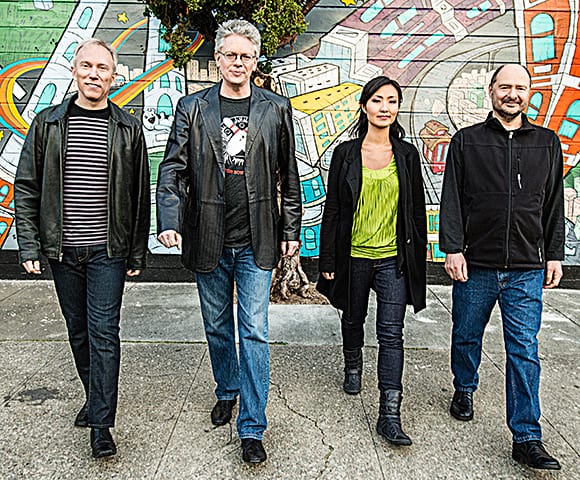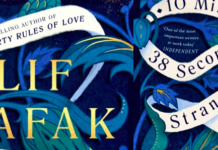 I remember very clearly the day that I was introduced to the Kronos Quartet. It was 1992 and I was in seventh grade. It was my third year of playing the violin, and my first year in the school orchestra at my international school in Riyadh, Saudi Arabia. Our teacher, conductor, and mentor Mrs. Meisinger brought in a documentary on VHS tape to our practice room and proceeded to introduce us to one of the most awesome things on the planet: The Kronos Quartet.
I remember very clearly the day that I was introduced to the Kronos Quartet. It was 1992 and I was in seventh grade. It was my third year of playing the violin, and my first year in the school orchestra at my international school in Riyadh, Saudi Arabia. Our teacher, conductor, and mentor Mrs. Meisinger brought in a documentary on VHS tape to our practice room and proceeded to introduce us to one of the most awesome things on the planet: The Kronos Quartet.
Four strings virtuosi with zealous energy, they were masters of their craft. But, their creativity and genius transcended the norms of the classical music genre, and came out in works of uncharted creation. Similar to how the prodigal genius of Dali had come out in masterpieces never seen before. They played music never before heard, and played it with the energy and zeal of hard rock, punk or techno. Their outfits and hairstyles rivaled rock stars in their uniqueness. Wow. Talent. Creativity. Originality. Energy. All transcending the borders of genre… From that moment on, I was hoping and praying that I would eventually get to witness them live someday, at some point in my lifetime.
The chance came eight years later in Baltimore, during my senior year in college. On April 29, 2001, in Shriver Hall at Johns Hopkins University; an evening that I still remember very clearly. And fortune had me cross paths with them again just a few weeks ago, on November 11, 2014, at the Cemal Resit Rey Concert Hall in Istanbul. Just a block from my current abode!
They had already been around for nearly two decades and were globally renowned in my introduction to them in 1992. Today they have become the longest-running quartet of all time. David Harrington formed the group in 1973, and John Serba on the violin and Hank Duff on the viola have been constants of the group since 1978. The chair of cello has changed a couple of times, and Sunny Yang has been the name claiming the spot since 2013. They have over forty studio albums, are renowned the world over and have had hundreds of string quartets composed especially for them. Needless to say, they also have been presented with countless awards, including a Grammy, and have record sales numbering in the millions.
At the CRR, the Kronos Quartet performed music from across the world, composed by artists from Iran, Serbia, Turkey and the United States. “I Will Prevent the Hunters from Hunting You” by Omar Suleiman had the term “rock stars” and “world music” crossing my mind. The “Tashweesh” of Ramallah Underground featured oriental tunes but also left us constantly on the edge of our seat with tension and mystery. It was eerie and full of suspense, but also somehow both delicate and vigorous. Nicole Lizee’s “Death to Kosmische” featured electronic buzzes, spatial noises and slurred notes of deep pitches and stacco synergy. Slurs fused into spooky tremolos and climaxed the suspense and eeriness crawling up our souls. Two unique instruments, the omnichord and the stylophone, created “spacey rock music” (as described by Harrington later on, backstage). And the Magoop # 2 (a vintage electronic instrument) creaked electronic buzzes as the music transitioned into an intensely eclectic lab of sounds and ended in a schizophrenic attack. Terry Riley, a long time collaborator of the Kronos Quartet with over twenty seven works composed especially for them, was featured as well. The quartet played his composition “The Gift,” in which repetitive and dulling constants created a drone drawing us into a hypnotic state of mind. There was also a composition by Steve Reich, titled “WTC 9/11.” It featured voice recordings made by witnesses to the attack, who described random moments from that day, and notes synchronized both in time and in pitch to these recorded utterances. Recorded tremolos echoed from the speakers, and the Kronos Quartet interjected suspense, mystery and hysteria into this main drill.
The interval was followed by Sahba Aminikia’s “Warp and Weft,” which merged recorded Persian monologues into a composition a-la-Kronos Quartet. The composition “Hold Me Neighbor in this Storm” by Alexandra Vrebalov introduced us to yet another instrument, the two-stringed Gusle. This piece featured church bells, tunes and singing that reminded me of Sufi music and old hymns from the mountains or the desert. Pizzicatos synchronized with thuds from the drum, vocal interjections of brisk ‘Hah!’s, brisk stomps of the foot, and tremolos and squiggly notes were the highlights of this piece. A cheerful measure here or there, but sarcasm and irony reigned. The cheers and applause in the end were able to extract two encores from the Kronos Quartet: “Crane,” a piece of sadness, and “Pinched,” a unique composition that provided a surprisingly cheerful end to the evening.
I meandered my way backstage after the finale and was greeted by four down-to-earth artists who not only accepted my requests for autographs and photos, but were even willing to chat with me about the pieces performed, the unique instruments featured and the European tour that had brought them here en route to Athens. I was even treated to backstage desserts. I left CRR beaming, almost doing cartwheels of joy and with fingers crossed that my next encounter would them would be much sooner than another decade on.










